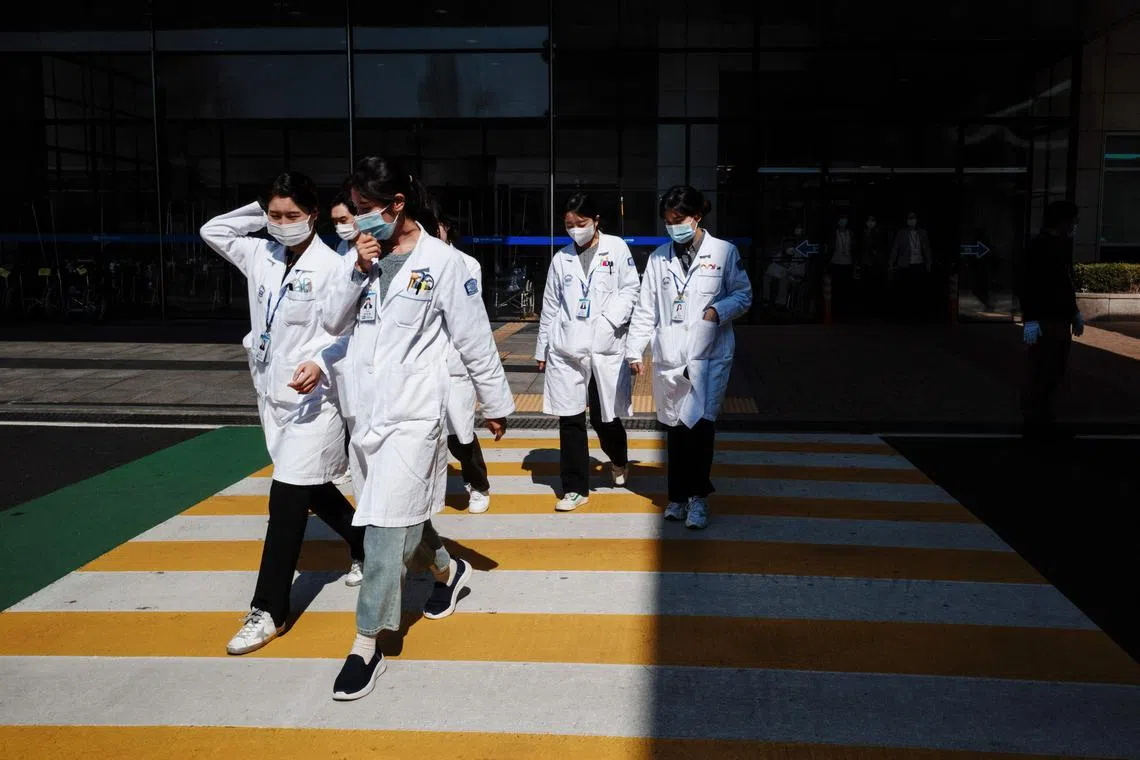Young doctors in South Korea abandon residencies, open dermatology clinics instead
Sign up now: Get ST's newsletters delivered to your inbox

The rise in general practices has coincided with mass resignations of residents in protest of medical school quota expansions in 2024.
PHOTO: AFP
Follow topic:
SEOUL – The number of general practitioners opening clinics in South Korea has grown sharply amid a prolonged stand - off between the government and the medical community
Data obtained by Representative Jeon Jin-sook of the Democratic Party of Korea from the Health Insurance Review and Assessment Service showed that 176 new general clinics were established between January and July in 2025, a 36.4 per cent increase from 129 during the same period in 2024.
In South Korea, general practitioners are doctors who obtain a medical licence after graduating from medical school and passing the national exam, but who do not complete a residency program.
Unlike board-certified specialists, they cannot use or advertise with specialty titles such as “otolaryngology clinic”.
However, they are authorised to diagnose and treat a wide range of conditions and may open general practice clinics that cover any medical field, depending on the equipment and facilities available.
Specialists, which the country tends to place a higher value on, by contrast, must complete both an internship and residency training before passing a board exam to receive certification in a specific field.
The rise in general practices has coincided with mass resignations of residents
While a majority of trainees have since returned, restoring residency numbers to about 76.2 per cent of pre-strike levels, some who left are believed to have abandoned training altogether and instead opened general clinics.
The 176 new clinics opened in 2025 registered an average of 2.4 treatment fields each, with dermatology accounting for 146 filings, or 83 per cent of the total. Plastic surgery followed with 49, family medicine 42, internal medicine 33 and orthopaedics 30.
The concentration reflects a broader trend. Dermatology and plastic surgery are considered “popular specialties” because of their high demand for non-reimbursed cosmetic procedures that fall outside the national insurance system. These fields tend to offer higher profits and lower legal risks than other fields.
Some board-certified specialists are also reportedly opening clinics under the status of general practitioners to provide dermatology services instead of pursuing the specialty they spent years to acquire.
Regional disparities were also evident. Nearly 70 per cent of new clinics were concentrated in the Seoul metropolitan area, with 72 in Seoul, 39 in Gyeonggi province and 12 in Incheon.
Gangnam-gu and Seocho-gu in southern Seoul together accounted for more than one-fifth of the total.
“The return of residents has been concentrated in popular specialties, and now new general clinics are showing the same trend, creating deeper polarisation,” Representative Jeon said.
“Policies are needed to prevent further gaps in essential medical care.” THE KOREA HERALD/ASIA NEWS NETWORK

